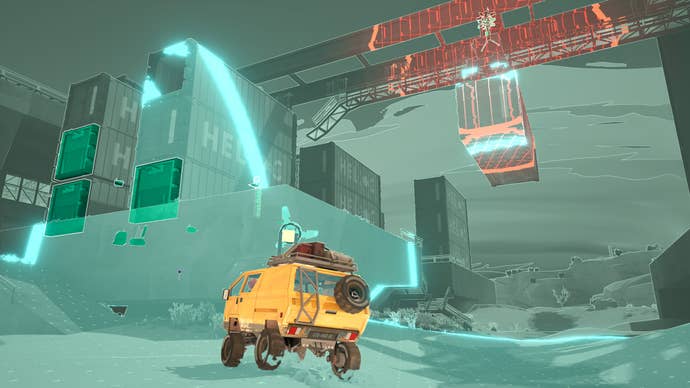Caravan SandWitch is a frictionless off-road jaunt which would've been better off as a linear experience
A cozy little adventure at odds with itself.
Caravan SandWitch prides itself in being a "narrative-driven exploration adventure," but what happens when the world that I should be dying to explore only gets in the way of the narration and overall pace?
Reviews have been kind to Plane Toast's game, which promises no conflicts and no fail states, just driving around a post-exploitation world while helping nomads and other folks left behind by the capitalist machine. It's an interesting sci-fi setup, but one that doesn't seem to go anywhere meaningful nor toothed due to the game's design-level limitations and a frustrating lack of focus.
It always sucks to jump into a well-meaning indie game with tons of passion and hard work clearly poured into it only to walk away disappointed, but it's a feeling that (at least for me) pops up more often than I'd like. This time around, I dig what Caravan SandWitch aims to do, but I don't think it fully comes together as a cohesive trip.
The premise is quite simple: Sauge comes down to the planet of Cigalo after spending some time living in outer space. Why did she leave? Why is she back there now? They're questions that could've propelled the narrative for hours had this been a narrative-driven game with a strong initial hook, yet they're answered in the first few minutes. Cigalo was a booming world once 'thanks' to colonization efforts, but now it's been left behind half-consumed by deserts and storms, and with the native alien population of frog-men trying to get by alongside nomads and workers who stayed behind because they could call Cigalo home at that point.
.png?width=690&quality=70&format=jpg&auto=webp)
Now, Sauge and her friends, most of which are presented all at once during the first half an hour or so, are trying to find out what happened to her lost sister by following an enigmatic transmission. It's the sort of thin premise that other indie studios would've turned into a tighter and punchier journey that lasted five hours tops. In the case of Caravan SandWitch, however, you're tasked with driving a van around to help small communities while collecting electronic parts compulsively. In fact, those parts are the key to all this, as each chapter's roadblock is just finding the amount of trash needed to cobble together upgrades for the van.
It's an odd way to structure a game whose exploration and puzzles are reduced to taking a quick look/stroll around some ruins and pushing buttons as soon as you see them. It doesn't feel comfortable in its own skin. We're reminded with each passing chapter of the urgency of searching for Sauge's sister, yet the backbone of the entire game is actually taking some time to interact with the population and help them out with their chores. It reminded me of Fallout 4's worst part, which is how the main story instantly crashed into the actual video game (your son has been kidnapped, here are a thousand ways in which you can get distracted).
.png?width=690&quality=70&format=jpg&auto=webp)
I keep reading glowing praise of the game's world and exploration, yet the tools and movement options I'm given are just too basic. There's an attempt at pulling off a Metroidvania-like loop with the van's gadgets, yet you can access pretty much the entire surface map (there's a limited underground) from the get-go and spoil yourself the surprise of coming across an especially striking tech base that was abandoned. You won't be able to open that one door yet, and that's it.
By Chapter 4, which is where things get really grindy and meandering (even fast travel is a hassle), it becomes abundantly clear that Plane Toast wanted to both tell a character-driven, melancholic story and deliver their own take on 'collectathon' open worlds, but couldn't crack how to merge both visions into a harmonious world. Maybe slightly deeper driving and platforming mechanics would've done the trick here, but the final iteration of Caravan SandWitch feels too scattered to make its narrative hit and too concerned with being accessible to truly make any of its gameplay elements shine. Likewise, there's a restraint to the overall design of the world map that results in a wide-open but ultimately small chunk of land that you'll know like the back of your hand by the third hour, leading to plenty of backtracking frustrations.

On the more positive side, Caravan SandWitch is pretty and artistically consistent. It also controls well enough, though the van itself gets stuck with so much ease the moment you wander off the beaten path for a few meters that you'll want to punch your screen around the fourth time you're forced to respawn at Nefle's garage. That's not very relaxing, I'd say. The music and sound design add a lot to the French Provence-inspired setting and were the only thing keeping my sanity levels in check as I was told to drive across the entire map once again just to complete a minor task. Sure, it never takes more than three or four minutes (unless I get distracted), but the promise of adventure soon turns into mundanity thrice as bad as what some people claim about Ubisoft's open worlds.
If anything, the positive reception proves that there's untapped market potential in creating charming and colorful worlds that don't bombard players with violence and progression systems. The fact Cigalo isn't presented as a depressing post-apocalyptic wasteland is a victory in its own. I just wish there was a bit more to Caravan SandWitch than enjoying Mediterranean-like alien vistas and picking up items if you're making me drive back and forth across the same sand dunes for eight hours while reading dialogue bubbles and chat logs. As I near the end stretch, I can only hope there's true sadness or joy at the end of this dusty road.

